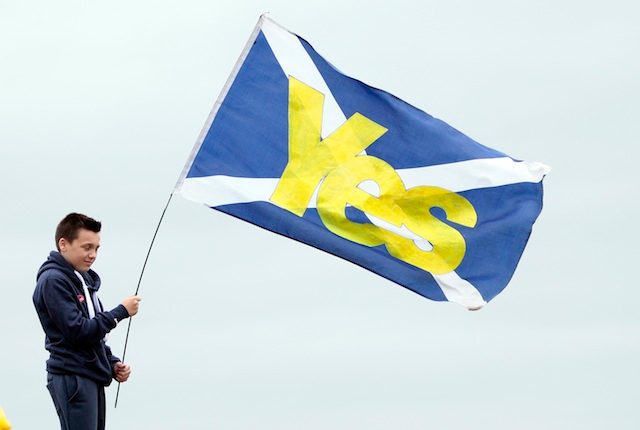SUMMARY
This is AI generated summarization, which may have errors. For context, always refer to the full article.

On Thursday, September 18, the question “Should Scotland Be An Independent Country?” will be put to a vote. Some 4 million Scottish voters, out of the 43 million registered voters in the United Kingdom, will either mark “yes” or “no” on their ballots. When it all started, “no” was “llamado” and enjoyed a commanding lead in the opinion polls. One independent poll reported 61%-No and 39%-Yes on August 7. But on the first weekend of September, “yes” has caught up and is no longer “dehado,” with some forecasting a 51%-49% lead in favor of yes.
The center of power, Westminster, and the 3 main UK political parties are now in shock because they assumed all along that “no” will easily win. The Queen is said to be worried too, but Her Majesty is officially “neutral” on the issue. Now, mainstream media, celebrities and politicians are rattled and scrambling over the very real prospect of a national amputation – Scotland may be an independent country soon.
Great Britain – the union of the kingdoms of England and Scotland, which along with the principality of Wales was created in 1707 to form a single kingdom with a single parliament – may no longer be. (READ: Scotland and England: A tale of rivalry and unity)
“Nothing else matters in politics now,” wrote one columnist; a settlement has to be found before the referendum to save the Union, wrote another. (READ: An independent Scotland: Issues at stake)
Whatever the results may be on September 18, Scotland is already breaking new ground and telling the world new things about independence and nationalism. They provide quite a few lessons that could very well inform similar debates elsewhere around the world, such as in Catalonia in Spain, Pattani in Thailand, or even in the Bangsamoro back home in Mindanao.
3 lessons
A first lesson is that the Scottish referendum presents itself as a model – that it is possible to formalize and affirm the creation of a modern nation-state through the ballot. Many nation-states were formed, and some still are being formed, through wars of national liberation. It may be foolish to say that what is happening in Scotland can automatically be replicated elsewhere. But the mere fact that the September 18 referendum is taking place shows that the ballot can midwife the birth of a new nation.

A second lesson is that nationalism is alive and well, despite having been written off as a spent and dying force in today’s globalized world. Though national boundaries today are too porous and populations have become too heterogeneous to claim a single, common ethnicity, religion or creed, “nations” can still emerge. Scotland is far from being just a nation of “Scots” – there are Muslims in Glasgow, Sudanese migrants in Dundee and Filipinos in Aberdeen. One English author who lived in the Philippines even compared Scots to Ilokanos – “frugal, hardworking, hard-headed.” In other words, nationalism is not necessarily exclusive, and can be open and inclusive. Indeed, it seems that for nationalism to succeed, it has to be a political project that accommodates and possible of being redefined by its participants, rather than just an ethnic movement that all too often becomes xenophobic and racist.
A third lesson is that people still do want their state and its institutions to be around and be an “equalizer” for the ordinary citizen. Conservative policies that reduce the state – such as tax cuts for the wealthy or the privatization of the national health service – are now being blamed for the exodus to the “yes” camp. Better a Scotland in our hands and where our own decisions matter, argue many “yes” voters, than a Scotland controlled by Westminster politicians who surrender everything to the market. Hence, Prime Minister David Cameron is not being used by the “no” camp in their campaign – one pundit put it that Cameron is less popular in Scotland than Windows 8.
Possibilities for the Bangsamoro
As September 18 draws near, I can’t resist the temptation to wonder about what is possible back home.
Will the Moros of southern Philippines also get their right to say “yes” or “no” to full independence (remember that previous referenda in Mindanao have been about whether or not to join autonomous administrative regions)? Will Moro nationalism be more inclusive and transcend the reputation of being exclusive to Muslims or to Tausogs, Maguindanaos and Maranaos? And will the politicians in Manila use the opportunity of drafting the Bangsamoro Basic Law (BBL) to tell the Moros that we do love them, after all?
I hope the different Moro liberation fronts, as well as members of Congress who will decide on the BBL, are watching the developments in Scotland. – Rappler.com
Eric Gutierrez is a senior adviser for an international development NGO in London, and is main author of the book “Rebels, Warlords and Ulama: A Reader on Muslim Separatism and the War in Southern Philippines.”
Add a comment
How does this make you feel?
There are no comments yet. Add your comment to start the conversation.